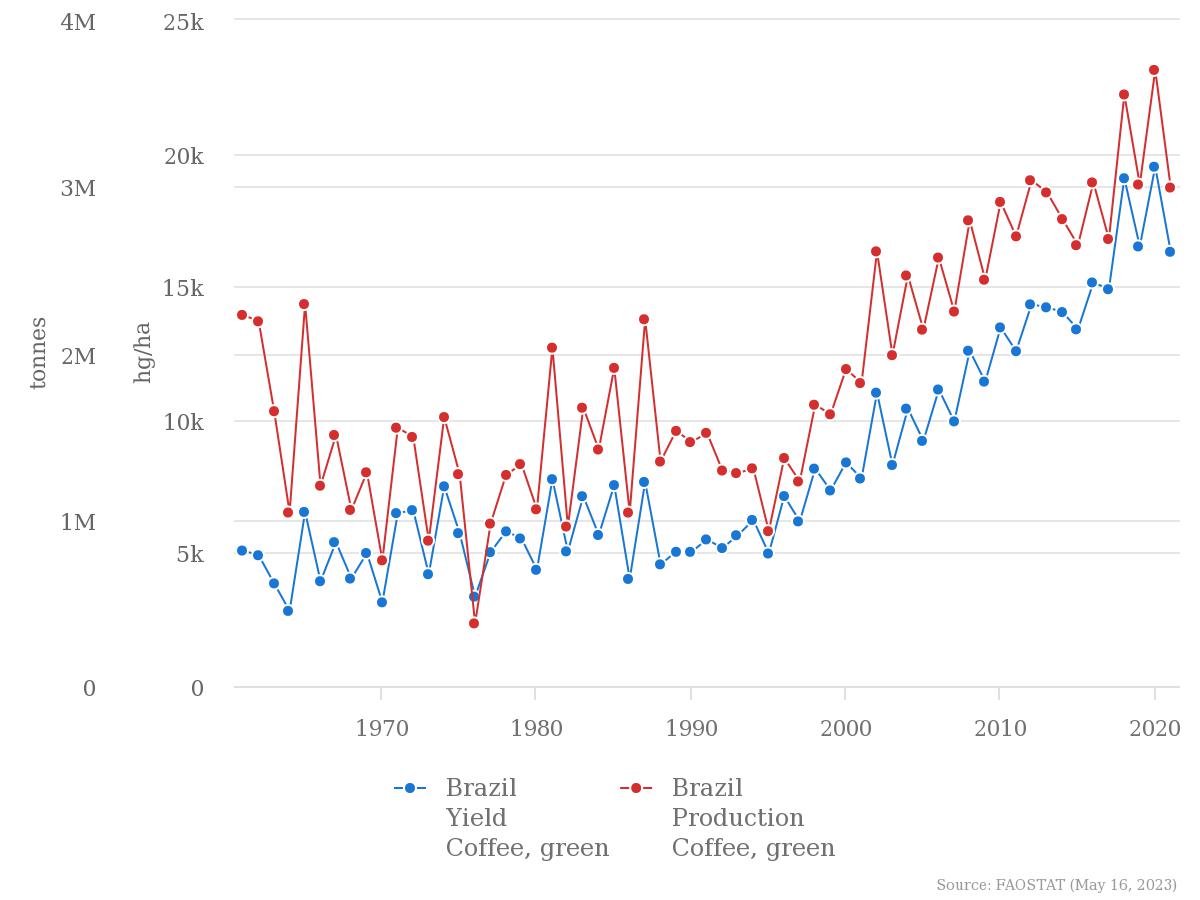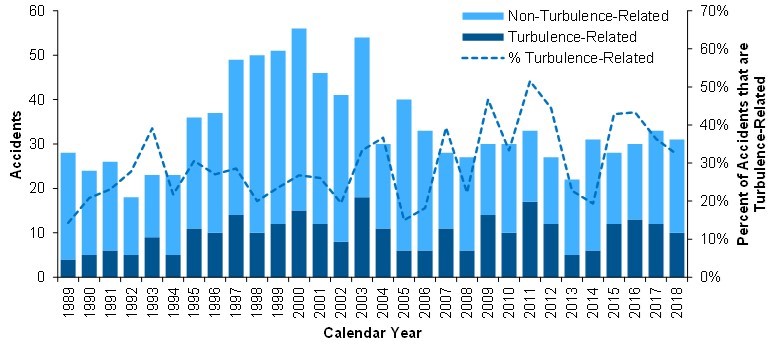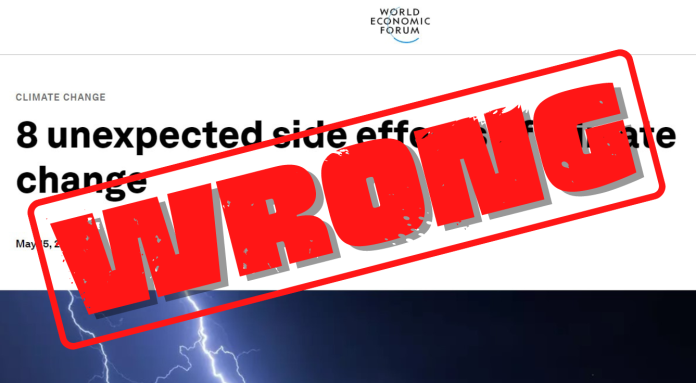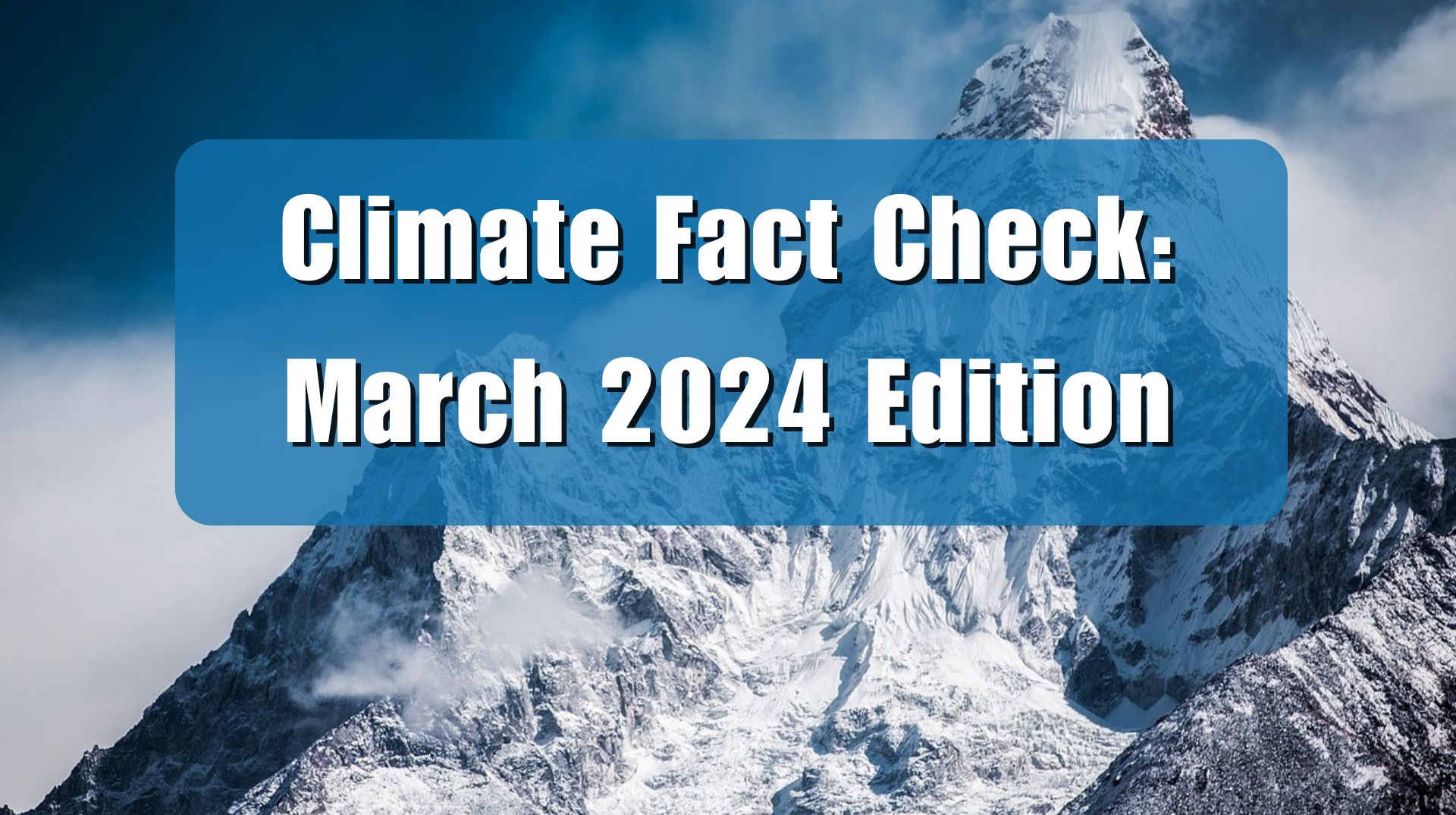An article posted to the World Economic Forum (WEF) blog on climate claims that climate change is having “unusual effects around the world.” In a short post, not all of the claimed effects can be checked, but the ones for which data is readily available suggest any climate impact is overblown if not entirely non-existent.
The article, “8 unexpected side effects of climate change,” lists several claimed deleterious effects of climate change, but upon further examination, available data easily refutes the claims.
Interestingly, there is a discrepancy between claims made in the article’s summary and the actual claims made in the paper itself.
The summary’s bullet points definitively state that climate change IS “impacting everything from the sex and size of animals to the state of wine and coffee crops,” and “it’s also making flights a lot bumpier and lightning strikes more frequent.” By contrast, the sections of the article related to these claims give no evidence that any of this actually happening. Instead, the WEF hedges its claims, by stating, the effects “could” or “may” be happening or might in the future. In addition, the WEF fails to examine other factors, besides climate change, possibly contributing to the changes it says are occurring, and unscientifically represents a single year’s weather anomaly as if it were representative of a long-term trend.
The WEF says that bearded dragons, native to Australia, are threatened by global warming because of a genetic trait where male embryos can “end up developing as female if incubated in a nest at a temperature of 32°C or higher[.]” This is a concern because “males could become increasingly rare as temperatures keep rising, leaving the entire species at risk of extinction.”
Among the problems with the WEF’s assertion about bearded dragons is that the environment is not a temperature-controlled incubator, and bearded dragons are able to choose where to lay their eggs. Field studies of this exact situation have been done, and while the researchers involved in one particular study, “Evolving thermal thresholds explain the distribution of temperature sex reversal in an Australian dragon lizard,” assert in the abstract that the dragons were particularly susceptible to climate change, their findings failed to actually show this. Instead, their research found that sex reversal is predominantly observed in a certain part of the species’ eastern range, and neither “climatic variables during the inferred incubation period nor geographic population genetic structure explain this disjunct distribution of sex reversal.” The researchers concluded that genetic adaptation can “counteract” the effect of high temperatures on sex reversal.
The science is hardly straightforward on this topic, because life and evolution are complex. Considering the fact that crocodilians and other reptiles that also display temperature induced sex-reversal have survived through long periods of much warmer and much colder average temperatures, it is unlikely that bearded dragons are at existential risk from modern climate change. Indeed, research indicates that ancestors of the bearded dragons themselves originated more than 250 million years ago, and that bearded dragons themselves originated more than 40 million years ago — eras when the planet was warmer than at present
Next, the WEF article claims that the quality and taste of wine is being impacted by climate change, or, at least, could be in the future. This claim is as misguided as it is unverifiable. As Climate Realism has pointed out, here, here, and here, for example, grape production has been rising over the past few decades of modest warming. That localized weather conditions like drought and temperature impact the flavor of wines is well known to wine producers. Vineyards are found in a variety of different climate regions around the globe, and there is no data showing that weather is becoming more unpredictable than in the past. Modest warming over the past hundred-plus years has not destroyed winemaking, but there is evidence that the range of winemaking regions has expanded with warming. This is a benefit.
WEF also claims coffee production is threatened by climate change, citing as proof, the case of Brazilian coffee producers, writing they “have faced substantially lower yields of Arabica beans this year because of frosts and droughts.” The WEF’s worldwide predictions of coffee losses are based on computer modelled growing projects for the next 30 years.Climate Realismhas posted dozens of articles demonstrating computer models are seriously flawed and that, as a result, their projections can’t be trusted. Lest one be concerned about Arabica bean production, data from Statista, shows Arabica bean production has increased by approximately 25 percent since 2005.
Crop production varies from year to year due to localized weather conditions. Farmer have recognized this fact since the agricultural revolution first occurred more than 10,000 years ago. Nothing has changed since then. Brazil’s single year arabica coffee bean decline does not reflect a long-term trend indicative of climate change. In fact, Brazil’s coffee production has been trending upwards during the recent period of modest warming, according to data from the United Nations Food and Agricultural Organization. (See Figure below)

Another assertion that the WEF makes is that air turbulence is getting worse because of climate change. However, as previously explained in Climate Realism here, here, and here, available data refutes this claim. According to a report from the International Civil Aviation Organization, there has been no increase in the accidents or injuries due to turbulence that one would expect if air conditions were worsening. (See figure below)

What the data shows, in fact, is that although air traffic and the number of passengers has increased dramatically, there has been no upward trend in increasing turbulence related accidents over the past 30 years.
While the WEF claim’s “clear air turbulence” is already increasing, the link provided by the WEF to support this claim provides no evidence to support it. Rather than providing real world data as proof for the claim, the study relies on projections from computer model simulations. Whereas the WEF claims that wind shear is stronger in the jet stream due to climate change, other climate research indicates the exact opposite has occurred. In either case, turbulence data shows no growing threat.
The claims made by the WEF, such Alpine mountain goats body size declining, an asserted increase in lightning strike frequency, a possible increase in volcano activity in the future, and “louder frogs,” are either pure speculation, sometimes based on flawed computer model scenarios, or fail to account for possible confounding or contributing factors aside from long-term climate change. WEF using words like “might” “could” and “may,” doesn’t inspire the same level of confidence as saying “data shows,” or “X has been measured.” The evidence suggests that the WEF is ignoring facts in pursuit of an agenda, because hard data fails to confirm any of the WEF’s “unexpected side-effects of climate change.”
















Excellent article. Thank you!